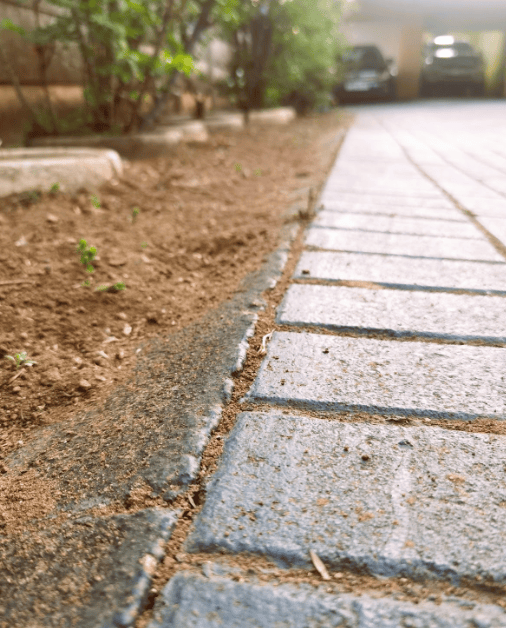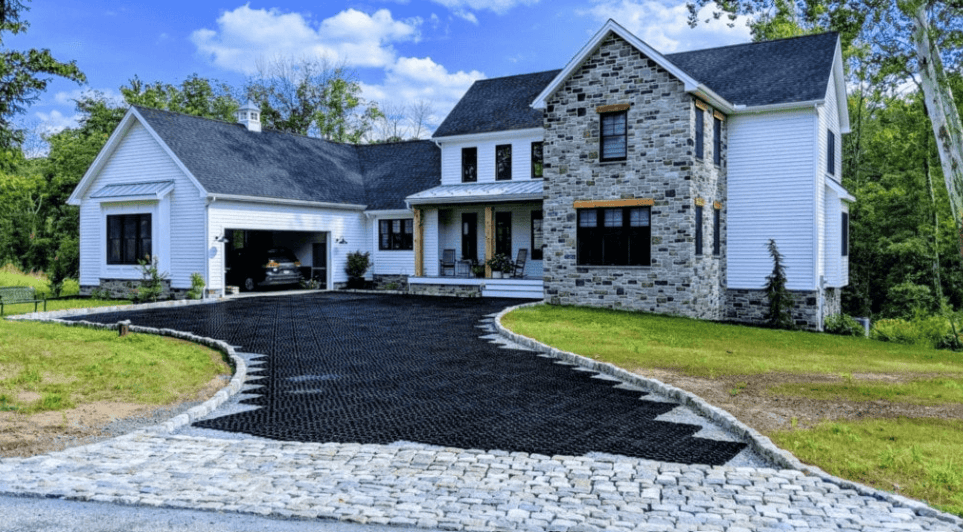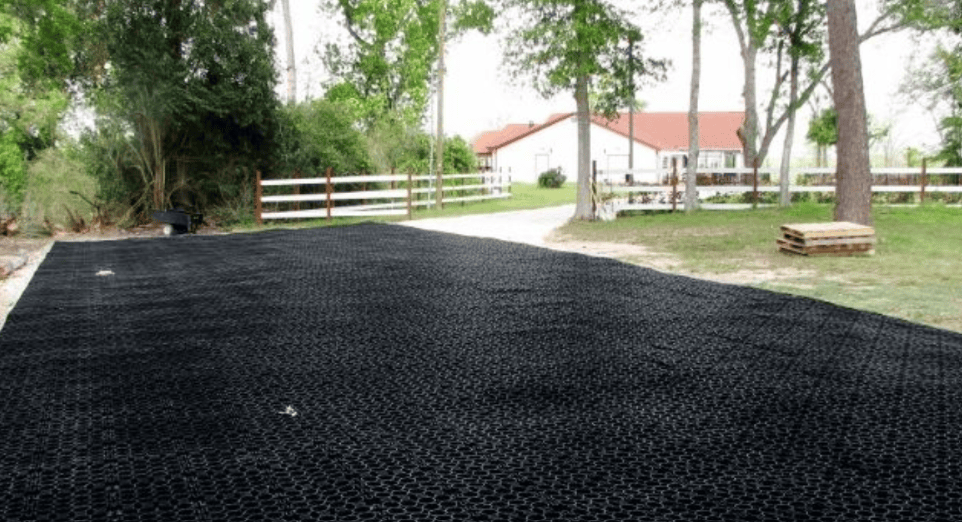When it comes to revamping your property, the choice of driveway material can significantly impact the aesthetic appeal, functionality, and sustainability.
This article explores the intricacies of brick driveways, their installation, maintenance, and design options, as well as cost considerations. We will also delve into the innovative solution of TRUEGRID® driveways, a durable and eco-friendly alternative, by offering insights through real-life examples.
Why Brick Driveways Are In Demand

Brick driveways are increasingly popular due to their unique combination of aesthetic appeal and practical benefits. Their distinctive look offers a range of colors and patterns and adds a classic and elegant touch to any property. Additionally, brick driveways are appreciated for their durability and eco-friendly qualities, as they often use natural materials and can have a long lifespan, with proper maintenance.
This blend of visual charm and functional advantages makes them a sought-after choice for homeowners looking to enhance their property’s curb appeal and value
The Pros and Cons of Opting for a Brick Driveway
Pros of a Brick Driveway
Aesthetic Appeal
Brick driveways offer a distinct and attractive look that surpasses the visual appeal of traditional concrete or asphalt driveways. The flexibility in design allows for creative patterns that can add a touch of artistry to your property.
Durability and Smooth Finish
Contrary to some beliefs, brick driveways can provide a smooth surface that can accommodate heavy traffic without significant wear and tear. They are built to last and to support substantial vehicle weight.
Eco-Friendliness
Often made from natural materials, brick driveways are considered more environmentally-friendly. Their longevity of around 25 years reduces the need for frequent replacements.
Cons of a Brick Driveway
Maintenance Requirements
Regular cleaning and resealing are crucial to maintain the integrity of a brick driveway. Without proper upkeep, the porous nature of bricks can lead to quicker erosion and damage.
Cost
Initially, brick driveways may cost more compared to other materials like concrete. The need for regular maintenance can also add to the long-term expenses.
Limited Design Options
Although available in a range of earth tones, brick driveways are somewhat limited in terms of shape and size variations, especially when compared to concrete pavers.
Building Your Brick Driveway: From Installation to Design
Installation Process
Installing a brick driveway is a detailed process that requires careful planning and precision to ensure longevity and functionality. Here’s a general overview of the installation steps:
- Site Preparation: The first step involves preparing the site. This includes clearing any vegetation, debris, or old paving materials. The ground is then leveled and graded to ensure proper drainage.
- Foundation Creation: A strong foundation is the key to the durability of a brick driveway. It typically involves excavating to a certain depth (often around 12 inches), followed by laying a layer of compacted gravel. The depth of excavation and the type of gravel used can vary depending on the soil type and climate.
- Sand Layering: After the gravel, a layer of sand is spread out to create a smooth, even surface. The sand acts as a cushion for the bricks and helps to lock them in place once they are installed.
- Laying Bricks: The bricks are laid on the sand bed in the chosen pattern. The bricks should be tightly placed together. Cutting may be required to fit bricks at the edges or around obstacles.
- Edging and Securing: To keep the bricks from shifting, edging materials such as metal or plastic edging are often installed around the perimeter of the driveway.
- Sand Filling and Compaction: After all the bricks are laid, additional sand is swept into the joints between the bricks. The driveway is then compacted using a plate compactor to settle the bricks and lock them in place.
- Finishing Touches: The final step involves cleaning the surface and checking for any uneven or loose bricks that need adjustment.
Installation Process Compared
- Concrete driveways require careful handling during pouring and curing, but they are less intricate to install.
- Asphalt driveways are quicker to install as the material is spread, leveled, and compacted with machinery.
- Brick and permeable pavers both require a detailed installation process, but permeable pavers are eco-friendly due to their water permeability.
Maintenance Costs
Repair Costs
Brick driveways have the advantage of individual brick replacement. If a brick gets damaged, it can be replaced without needing to redo the entire driveway. The cost for brick pavers ranges from $0.50 to $1.80 per brick, or $2 to $8 per square foot. Repairing spalling (where the surface layer flakes away) in brickwork can cost between $0.25 to $4 per brick.
Leveling Sunken Areas
If parts of the driveway become sunken, it can be rectified by removing the bricks, filling the space with sand, and re-compacting. This process helps to maintain a flat and even surface.
Tree Root Damage
In cases where tree roots spread underneath the bricks and cause an uneven surface, tree removal may be required. This can cost on average between $320 to $800.
General Maintenance
Regular cleaning and potentially resealing (depending on the brick type and exposure to substances like grease or oil) are important. Clay brick pavers typically do not need to be sealed unless frequently contacted by grease and oil, when they should be washed with water and detergent as needed.
Cost Variability
It’s important to note that these costs can vary significantly based on local labor rates, the extent of the damage, and the specific type of bricks used. Therefore, it’s always a good idea to get multiple estimates from local contractors for the most accurate cost assessment.
Maintenance Costs Compared
- Brick vs. Concrete: Brick driveways require individual brick replacement and periodic resealing, while concrete driveways may need less frequent but more extensive repairs like crack filling and surface resealing.
- Brick vs. Asphalt: Asphalt driveways require regular sealing and are more prone to cracking and fading which results in potentially higher long-term maintenance costs. On the other hand, brick driveways mainly require periodic cleaning and selective brick replacement.
- Brick vs. Permeable Pavers: TRUEGRID® permeable pavers are highly resistant to oils, gasoline, acids, salt, ammonia, and alcohol, unlike brick driveways. Their exceptional durability significantly reduces maintenance needs, which makes TRUEGRID® permeable pavers a cost-effective and low-maintenance choice compared to traditional brick driveways.
Brick Choice and Design
Variety in Paver Materials
Homeowners can choose from a range of materials for their driveway pavers, including concrete, cement, cobblestone, and brick pavers. Each material provides distinct advantages in terms of style, cost, and maintenance to allow for ample customization to match the homeowner’s personal style and the home’s architectural design.
Popular Paver Patterns
There are several popular patterns for laying brick pavers, each with its unique aesthetic appeal and benefits. Some of the most common patterns include:
- Herringbone: An interlocking V-shape pattern known for its strong visual appeal and stability, so it is suitable for areas with heavy traffic.
- Basketweave: Resembling a woven basket, this pattern offers a vintage look and is relatively simple to lay out, which makes it suitable for traditional styles.
- Running Bond: Featuring bricks laid end-to-end in linear lines, this pattern is simple and elegant and can make narrow areas appear wider.
- European Fan: A sophisticated fan-like radial layout that requires professional installation.
- Circular: Radiating from the center in circles, this pattern is dynamic and unique, and is ideal for curved driveway designs.
- Stack Bond: A grid-like, checkered pattern that offers a modern and orderly look, and is best suited for areas with lighter traffic.
Design Flexibility
Modern driveway design trends include mixing materials and styles to create unique and visually captivating driveways. For instance, combining concrete and brick pavers can add variety and a distinct aesthetic to the driveway. The use of contrasting materials and colors for driveway borders is also a rising trend that can enhance the driveway’s definition and visual interest.
Eco-Friendly and Smart Driveway Options
Green driveways using permeable materials are gaining popularity for their environmental benefits. The integration of technology into driveways, such as smart driveways with built-in sensors and LED lighting, is an emerging trend that provides both functional and aesthetic benefits.
Cost Considerations
The cost of a brick paver driveway generally ranges from $10 to $30 per square foot, depending on the quality of materials, complexity of the design, and local labor rates. More intricate designs and higher-quality materials will result in a higher overall cost.
TRUEGRID®: A Sustainable Alternative to Brick

TRUEGRID® is an innovative alternative to traditional brick driveways. TRUEGRID® permeable pavers are a sustainable and eco-friendly solution for those seeking a durable and attractive driveway for their home or business. Made from 100% recycled plastic, TRUEGRID® pavers not only reduce plastic waste, they also allow rainwater to seep through in order to reduce surface runoff and promote groundwater recharge.
Pros of TRUEGRID® Permeable Pavers:
- Eco-Friendly: TRUEGRID’s commitment to sustainability makes it an eco-conscious choice. Its permeable design reduces stormwater runoff to help benefit the environment.
- Durability: TRUEGRID® pavers are highly durable and resistant to UV rays and stains, which makes them suitable for various climates.
- Low Maintenance: Unlike traditional brick driveways, TRUEGRID® requires minimal maintenance to save time and effort.
- Cost: TRUEGRID® permeable pavers are often times ⅓ to ½ the cost, per sq ft, vs brick pavers.
Cons of TRUEGRID® Permeable Pavers:
- Limited Design Options: With a wide variety of infill gravel choices, TRUEGRID® offers versatility, however, it may have somewhat limited design capabilities compared to traditional brick. The range of colors and patterns with brick may be more extensive to allow for intricate and custom designs.
- Grass Infill Limitations: When grass infill is used with TRUEGRID, traffic frequency is limited to about four or fewer passes per day to protect the grass blades from overuse.
Real-Life Examples:
EVENT CENTER PARKING, DAYTON, TX

A compelling real-life example of TRUEGRID® in action is at the Event Center Parking, in Dayton, Texas.. The center required a permeable, durable, and aesthetically pleasing solution for their parking lot, and TRUEGRID® delivered, by transforming the space into a functional and eco-friendly parking facility that could withstand heavy vehicle traffic.
NEW BRAUNFELS STORAGE FACILITY, NEW BRAUNFELS, TX

The New Braunfels Storage Facility in Texas is another testament to the performance and sustainability of TRUEGRID®. The facility needed a sturdy and permeable surface for their RV and boat storage, and TRUEGRID® pavers were the perfect solution. The result is a high-performing, eco-friendly surface that effectively manages stormwater, reduces the heat island effect, and provides a robust surface for heavy vehicle storage.
Upgrade to TRUEGRID®: Discover the Eco-Friendly Alternative to Brick Driveways
Discover the future of sustainable driveways withTRUEGRID® permeable pavers. Experience the unmatched durability and eco-conscious design that our solutions offer.
Contact us today for more information!



